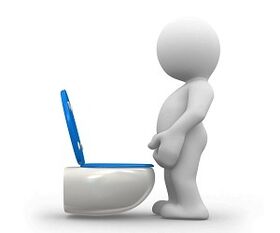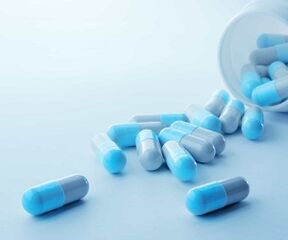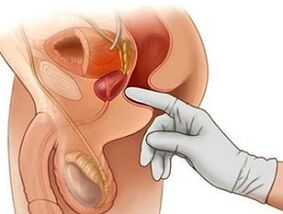Prostatitis is the most common pathology of the genitourinary system in men of reproductive age.When prostatitis occurs, the prostate becomes inflamed and swollen.
The disease is treated conservatively.The patient is prescribed medications that help improve diuresis, relieve inflammation of the glandular organ and suppress pathogenic microflora in the prostate.
Treatment is complemented by diet, physiotherapy and various other activities.The patient may be prescribed physiotherapeutic procedures, including prostate massage.
Causes of prostatitis
Prostatitis is a disease accompanied by inflammation of the glandular organ.The disease progresses most often due to pathogenic microflora entering the prostate gland.Furthermore, not only bacteria, but also fungal microorganisms can cause inflammatory processes.
Often, prostatitis is a consequence of sexually transmitted diseases, including candidiasis, trichomoniasis, syphilis, human papillomavirus, chlamydia and others.
Other factors can provoke inflammatory processes in the prostate, namely:
- Lack of physical activity.
- Prolonged sexual abstinence or, on the contrary, excessive sexual activity.
- Unbalanced diet, obesity.
- The presence of chronic diseases of the genitourinary system.
- Perineal injuries.
- Hormonal disorders, including insufficient synthesis of testosterone (male sex hormone).
- Harmful working conditions.
- Overheating in the pelvic region.
- Hypothermia.
- Smoking, drug and alcohol addiction.
Important!Congenital pathologies of the urethra can also provoke inflammation of the prostate.
Symptoms and diagnosis of prostatitis

When considering the causes of prostatitis in men and its drug treatment, one cannot ignore the symptoms of the disease.As you know, prostatitis can have different etiologies.
Doctors distinguish congestive, fungal, non-bacterial, bacterial, autoimmune, asymptomatic and allergic prostatitis.The most common forms are stagnant and bacterial.
The characteristic symptoms of prostate inflammation are:
- Frequent urge to urinate.The frequency increases at night.
- Intermittent and painful urination.If prostatitis was provoked by pathogenic microorganisms, the urine becomes cloudy and purulent/curdled/mucous impurities appear.
- Power violation.In severe cases, erectile dysfunction develops.
- Premature ejaculation.It turns out that with prostatitis, on the contrary, a man cannot orgasm for a long time.
- Pain in the perineum and pubis.The pain syndrome intensifies during sexual intercourse and urination.
- Constipation.
- Burning and itching in the urethra.
With the development of an acute bacterial form of prostatitis, a man develops symptoms of intoxication.Body temperature rises, general weakness, insomnia and irritability appear.
If symptoms characteristic of prostatitis appear, you should consult a urologist.Diagnosis involves passing a series of tests and instrumental examinations.
The patient must undergo a prostate ultrasound, prostate LBC culture, prostate digital rectal examination, general and biochemical blood test, urinalysis, PSA blood test, PCR and spermogram.
Important!After the diagnosis, the doctor makes the diagnosis and prescribes the appropriate medications.
What medications are used for prostatitis?

In the treatment of prostatitis, antibiotics are the mainstay of therapy.Broad-spectrum antibiotics are used.The patient may be prescribed cephalosporins, fluoroquinolones, macrolides and penicillins.
Antibiotics suppress the infection, thereby stopping the inflammatory process in the prostate.
In addition to antibiotics, the following are prescribed:
- Alpha-adrenergic blockers.Medicines are used both in the treatment of prostatitis and in the treatment of prostate adenoma.Medications help improve diuresis and relieve unpleasant symptoms when urinating.Medicines must be taken over a long period of time.
- Nonsteroidal anti-inflammatory drugs.They are used during periods of exacerbation of prostatitis.Medications help relieve pain.NSAIDs are used, available in the form of tablets, injectable solutions and suppositories.
- Hormonal medications.They are prescribed if NSAIDs do not help relieve pain.
- Bioregulatory peptides.These medicines contain bovine prostate extract.Modern peptides help stop the inflammatory process and improve tissue trophism.The products also help to normalize potency and blood circulation in the pelvis.
For auxiliary purposes, you can use pharmaceutical dietary supplements, homeopathic and naturopathic remedies.Medications can even be taken to prevent prostatitis.
If you need to normalize potency, you can use PDE-5 inhibitors, homeopathic remedies or dietary supplements.
It is important to note that 5-alpha reductase inhibitors are not used for prostatitis.These medications are prescribed for benign prostatic hyperplasia.
Important!If the diagnosis shows that there are stones in the prostate, the patient will undergo surgery.
Additional recommendations

Using medication for prostatitis is not enough.To transfer the disease to a stage of stable remission, complex and well-structured therapy will be required.
In the case of a stagnant form of the disease, prostate massage with fingers is mandatory.The procedure must be performed by a urologist.If you don't want to constantly visit doctors, you can purchase a prostate stimulator.
This device will help you perform a massage at any convenient time of the day.The instructions for stimulants say that they should be inserted into the anus.First a cleansing enema is administered, a condom is placed on the device and the anorectal area is sanitized.Modern massagers have a vibrating head, which helps to increase the effectiveness of the physiotherapeutic procedure.
The patient is also recommended:
- Limit the amount of fatty, sweet and starchy foods in your diet.The ideal is to follow a low-carb diet.
- Get exercise therapy and lead an active lifestyle.It is quite possible to go in for sports.The most useful sports are swimming, Nordic walking, running and yoga.
- Be sexually active.It is imperative to use barrier contraception (condoms).Regular sex will improve blood circulation in the pelvis and the outflow of prostate secretions.
- Follow a daily routine, sleep 6 to 8 hours a day.
- Give up bad habits.Scientific reviews have proven that prostatitis develops much more often in men who smoke, use drugs and alcohol.That's why doctors recommend giving up these bad habits once and for all.
- When treating prostatitis, you can use traditional methods.They are not a panacea and can only act as a supplement.Good folk remedies are hazelnut infusion, wormwood infusion, propolis suppositories, parsley infusion.
Based on the above, we can conclude that prostatitis is not a death sentence.The disease is completely treatable.If you consult a doctor in a timely manner, you can get rid of the disease quickly and almost painlessly.
You should not let the disease take its course, because prostatitis is an extremely dangerous pathology.Premature treatment is fraught with BPH, prostate cancer, infertility, impotence and premature ejaculation.

























